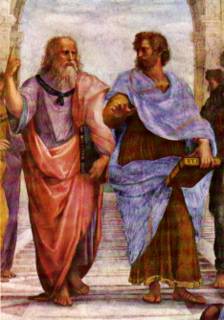Look at the hand gestures...
Plato - holding the Timaeus - Pointing up as a sign of his metaphysical belief in the higher world of the forms, shown with the face of Leonardo.
Aristotle - holding his Ethics with hand palm down, reflecting a more grounded approach to the problem of universals

......then read the statement at the very top of the page.
PLato saids,"Look to the perfection of the heavens for truth," while Aristotle saids "look around you at what is, if you would know the truth"
These "archetypes," were very much evident in the relation of Gell-Mann and Feynman?
This relationship painted by Raphael sits in the Room of the Segnatura in Rome, called the Raphael rooms. You can type in the "Raphael rooms" at the top of page on the blogger and use that search function.
While I do not like to infer such attributes to the signatures the Pope signs, I do believe that the ancient mind tried to capture the deeper meaning of these individuals, Plato and Aristotle. As I try to do.
Epistemology (Wikipedia 30 May 2006)
The Theaetetus account of Plato further develops the definition of knowledge. We know that, for something to count as knowledge, it must be true, and be believed to be true. Plato argues that this is insufficient, and that in addition one must have a reason or justification for that belief.
Plato defined knowledge as justified true belief.
One implication of this definition is that one cannot be said to "know" something just because one believes it and that belief subsequently turns out to be true. An ill person with no medical training but a generally optimistic attitude might believe that she will recover from her illness quickly, but even if this belief turned out to be true, on the Theaetetus account the patient did not know that she would get well, because her belief lacked justification.
Knowledge, therefore, is distinguished from true belief by its justification, and much of epistemology is concerned with how true beliefs might be properly justified. This is sometimes referred to as the theory of justification.
Hand gestures have many different meanings? Look at Buddha?

No comments:
Post a Comment